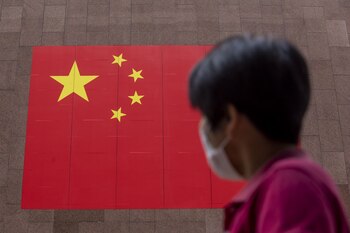
(Bloomberg) -- Chinese state media urged action to keep Hong Kong elections from becoming a “tool for anti-China and trouble-making forces,” raising the prospects for more measures to curb dissent in the Asian financial hub.
The People’s Daily newspaper, the mouthpiece of the ruling Communist Party, said in a commentary Tuesday that those found to be disloyal must not be allowed to seek office. Action could come as soon as next week, with the Standing Committee of the National People’s Congress -- the body that imposed a controversial security law on Hong Kong last year -- also announcing a surprise meeting starting Jan. 20.
“Hong Kong is an administrative region of China,” the People’s Daily said. “‘Those who love the country and love Hong Kong should rule Hong Kong, those who are anti-China and trouble makers are out’ is a principle and bottom line that Hong Kong elections must follow.”
The commentary suggests that China’s efforts to rein in an opposition that it blames for a wave of historic and sometimes violent protests in 2019 are far from over. Besides imposing the security law in June, authorities have barred numerous candidates from office, arrested several former lawmakers and delayed an election that was planned for September.
All opposition lawmakers resigned from the local Legislative Council in protest against the actions. Earlier this month, the new national security unit of the Hong Kong police arrested 55 people in connection with an unofficial primary to choose candidates for the delayed election, an incident cited by the People’s Daily commentary as a reason for action.
China’s actions have drawn international condemnation and the U.K. and U.S. have accused Beijing of breaking its treaty obligations to preserve liberal institutions, such as legislative elections, in the former British colony. The NPC Standing Committee meeting will start the same day as U.S. President-elect Joe Biden will be inaugurated as president on a platform to preserve democracies around the world.
China’s leaders are considering an overhaul of the election committee that selects Hong Kong’s chief executive, the South China Morning Post newspaper reported last month. Authorities were planning to reduce the already-limited influence democracy advocates wield on a panel controlled by pro-China loyalists, with candidates needing to be approved by Beijing, the newspaper said.
Hong Kong media outlets have also reported that China’s legislature could move to disqualify some pro-democracy district councilors, many of whom took office after a landslide 2019 victory following the landmark protests. Opposition politicians had once hoped to use that momentum to ride to a majority in the more important Legislative Council before elections were delayed for a full year, ostensibly due to coronavirus risks.
State media reports on the upcoming NPC meeting made no mention of Hong Kong, with a draft revision of a law on animal epidemic prevention on the agenda. Still, the body has previously announced debate on issues related to Hong Kong at the last minute, such as when it took up and approved the national security law behind closed doors, with no local debate.
More recently, the body ruled that Hong Kong’s government could expel Legislative Council lawmakers who were deemed insufficiently patriotic, a move that prompted the mass resignation of the remaining opposition members. There’s also a chance the committee could use next week’s meeting to clarify certain aspects of the national security law, which Hong Kong lawyers, foreign governments and human rights groups have called worryingly vague and open to interpretation.
Últimas Noticias
Debanhi Escobar: they secured the motel where she was found lifeless in a cistern

The oldest person in the world died at the age of 119

Macabre find in CDMX: they left a body bagged and tied in a taxi
The eagles of America will face Manchester City in a duel of legends. Here are the details

Why is it good to bring dogs out to know the world when they are puppies




